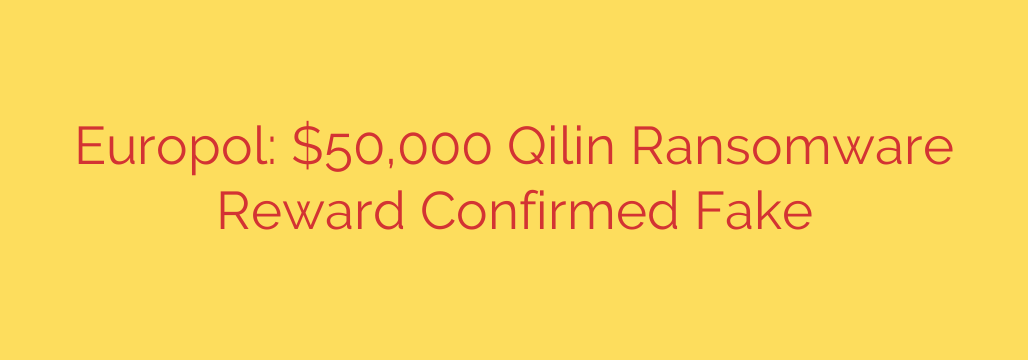
Fake $50,000 Reward for Qilin Ransomware Gang Sparks Intrigue
In a strange twist within the cybercrime underworld, a supposed reward offer for information leading to the arrest of the Qilin ransomware group has been officially debunked. A notice posted on a dark web forum claimed that Europol, the European Union’s law enforcement agency, was offering a $50,000 bounty for details on the gang’s leadership. However, this claim has now been exposed as a deliberate piece of misinformation.
Europol has officially confirmed the reward offer is false. The agency clarified that it does not typically offer rewards for information in this manner. Any legitimate bounties or public appeals are announced exclusively through its official website and verified communication channels. This incident serves as a stark reminder to treat information from unofficial sources, especially those on the dark web, with extreme skepticism.
Who is the Qilin Ransomware Group?
To understand the context of this deception, it’s crucial to know the target. Qilin is a prominent Ransomware-as-a-Service (RaaS) group known for its sophisticated attacks against critical infrastructure worldwide. Operating since at least 2022, the group has targeted a wide range of sectors, including healthcare, education, and manufacturing.
Like many modern cybercriminal organizations, Qilin employs double-extortion tactics. This means they not only encrypt a victim’s sensitive files to disrupt operations but also steal copies of the data. If the victim refuses to pay the ransom, the group threatens to leak the stolen information publicly, adding immense pressure and potential regulatory fines to the ordeal. The group’s high-profile attacks have made them a significant target for international law enforcement.
Decoding the Deception: Why Create a Fake Reward?
The creation of a fake Europol reward raises compelling questions about the motivations behind it. While the true purpose remains speculative, cybersecurity experts point to several plausible scenarios:
- Internal Conflict: The hoax could be the work of a disgruntled affiliate or former member of the Qilin group. By creating a fake bounty, they may be attempting to sow paranoia and distrust within the organization, hoping to destabilize its leadership.
- Inter-Gang Rivalry: Another ransomware group could be responsible, using the fake reward as a psychological operation. This tactic aims to create chaos for a competitor, potentially luring Qilin members into making mistakes or revealing their identities while trying to figure out who is targeting them.
- A Sophisticated Scam: The post could be a trap designed to lure would-be informants. Individuals responding to the fake offer might be tricked into revealing their own sensitive information or even be targeted for financial scams themselves.
This event highlights the complex and often treacherous dynamics within the cybercrime ecosystem, where deception is a tool used not just against victims but also among criminals.
How to Protect Your Organization from Ransomware Threats
The threat posed by groups like Qilin is real and persistent. Organizations must adopt a proactive and layered security strategy to defend against these attacks. Here are essential steps to enhance your cybersecurity posture:
- Implement Multi-Factor Authentication (MFA): MFA is one of the single most effective controls to prevent unauthorized access to your network, even if credentials are stolen.
- Maintain Robust Backup Protocols: Regularly back up all critical data using the 3-2-1 rule (three copies, on two different media types, with one copy off-site and offline). Ensure you test your backups frequently to confirm they can be restored.
- Conduct Regular Employee Training: Your staff is a crucial line of defense. Train them to recognize and report phishing emails, suspicious links, and other social engineering tactics commonly used to initiate ransomware attacks.
- Enforce Strong Patch Management: Promptly apply security patches to all operating systems, software, and firmware. Attackers frequently exploit known vulnerabilities that have available fixes.
- Segment Your Network: By dividing your network into smaller, isolated segments, you can help contain a ransomware infection and prevent it from spreading across your entire infrastructure.
Ultimately, the fake Qilin reward is more than just a curiosity; it’s a window into the psychological warfare that defines modern cybercrime. While law enforcement agencies continue their work, the primary responsibility for defense rests with organizations taking vigilant, proactive steps to secure their digital assets.
Source: https://www.bleepingcomputer.com/news/security/europol-confirms-that-qilin-ransomware-reward-is-fake/








